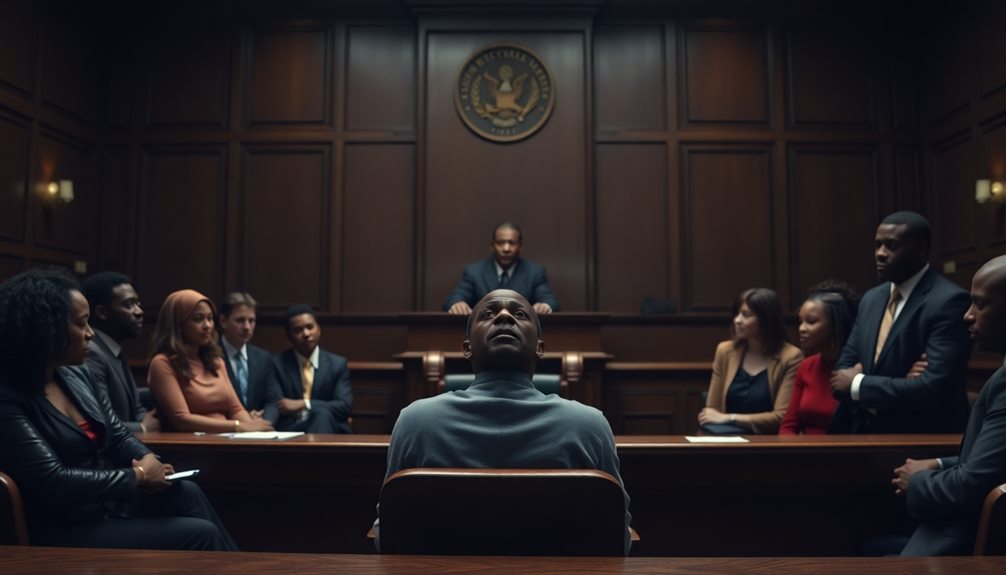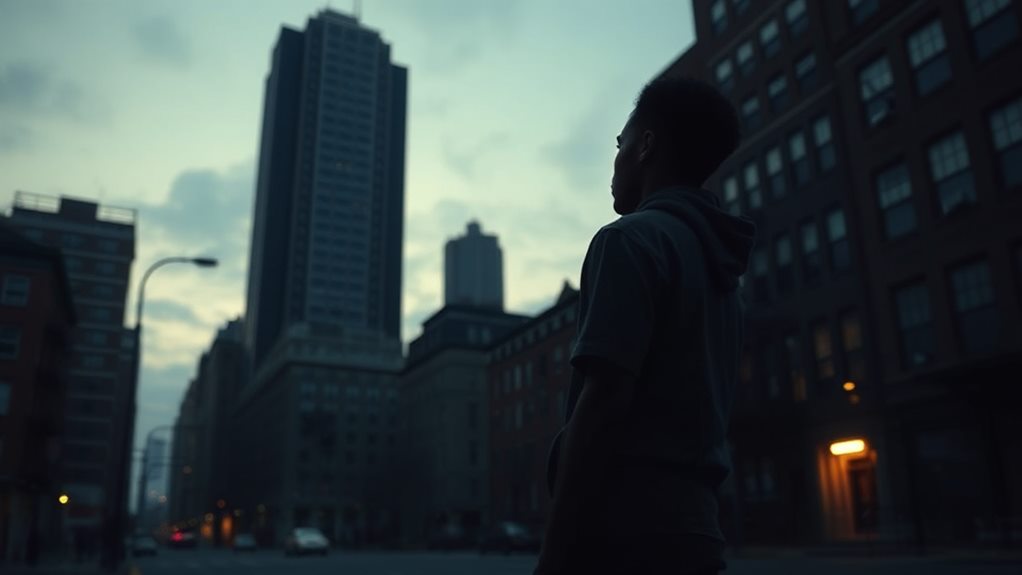In "Native Son," you explore the life of Bigger Thomas, a young black man trapped by systemic racism in 1930s Chicago. As he navigates poverty and limited opportunities, his initial hope as a chauffeur quickly deteriorates. The accidental murder of Mary Dalton marks a turning point, propelling him into a cycle of fear and isolation. Bigger's trial highlights the racial injustices of the legal system, where biases distort perceptions of his humanity. Though his fate seems bleak, hints of hope and resistance emerge, suggesting a deeper struggle for agency amid the harsh realities of life. There's so much more to uncover about Bigger's story.
Overview of "Native Son"
In *Native Son*, Richard Wright immerses you in the harrowing world of Bigger Thomas, a young black man traversing the oppressive landscape of 1930s Chicago. You see how systemic racism shapes Bigger's life, forcing him into a world of poverty and limited opportunities.
The novel, divided into three parts—"Fear," "Flight," and "Fate"—captures the escalating tension in Bigger's life as he grapples with his identity and place in a society dominated by white people. This narrative unfolds against the backdrop of racial inequalities and the poverty cycle, emphasizing the complex power dynamics at play in Bigger's existence the complexities of power dynamics.
When Bigger takes a job as a chauffeur for the Dalton family, their well-meaning but ignorant attitudes only amplify his feelings of alienation. An accidental encounter leads to the tragic killing of Mary Dalton, setting off a chain of events that culminates in Bigger's trial.
You witness how the American criminal justice system fails African Americans, ultimately sentencing Bigger to death despite the circumstances surrounding his actions.
Wright critiques this system, showcasing its inherent biases and the impact of racism on a young man's fate. Yet, amid despair, there are glimmers of hope in Bigger's interactions with his defense lawyer, Boris Max, hinting at the potential for resistance and change.
Bigger's Journey and Alienation
Bigger Thomas's journey through a society rife with racial tension reveals the deep alienation he feels, both within himself and in relation to others. As a black man working as a chauffeur for the Dalton family, Bigger initially feels a glimmer of hope. However, that hope quickly fades when he realizes the Daltons' well-meaning liberal attitudes only serve to highlight the racial divide that marginalizes him. Their attempts to connect with him are rooted in ignorance, leaving him feeling more isolated.
This experience of alienation resonates with the themes of resilience and courage found in defiance against evil, as both Bigger and Liesel Meminger navigate oppressive societal structures that seek to dehumanize them.
The turning point comes during a fateful night out with Mary Dalton, where an accidental killing of a white woman shatters his world. This moment amplifies Bigger's fear and sense of entrapment, forcing him to confront the harsh reality that society views him as a threat.
As he grapples with the consequences of his actions, Bigger's alienation deepens, transforming from mere discomfort into profound isolation. He understands that his race condemns him in the eyes of the law and society, driving him to flee from justice.
Bigger's journey starkly illustrates the systemic racism that dehumanizes individuals and perpetuates cycles of fear and despair.
The Trial and Racial Injustice

The trial of Bigger Thomas stands as a stark illustration of racial injustice, exposing the deep-seated biases that permeate the legal system. From the start, the prosecution paints Bigger as a monster, manipulating the jury's fears and prejudices.
As you follow the proceedings, you see how Bigger struggles against a system rigged to condemn him. His defense attorney, Mr. Boris Max, a Communist lawyer, tries to advocate for him, but he grapples with the overwhelming cultural context and systemic racism that influences jurors' perceptions. This dynamic resonates with themes explored in Ta-Nehisi Coates' work, where he illustrates how systemic oppression shapes the Black experience and the challenges faced in confronting uncomfortable truths about race systemic racism in America.
The trial glaringly neglects Bessie's murder, highlighting the racial blindness that values the life of a white woman over a black one. This devaluation starkly reflects the realities of a society steeped in racial injustice.
Despite Max's attempts to push for a life sentence instead of the death penalty, Bigger is found guilty and sentenced to death, a grim outcome that underscores the harsh truths faced by black individuals.
The trial serves as a powerful critique of the American criminal justice system, demonstrating how societal perceptions of race shape legal outcomes and perpetuate injustice.
Themes of Racism and Poverty
Racism and poverty intertwine throughout *Native Son*, creating a powerful commentary on the systemic issues that plague society. Bigger knows that he's trapped in a cycle of systemic oppression, where his race and economic status dictate his life's trajectory. Living in South Side Chicago, he faces harsh realities that limit his opportunities, amplifying his feelings of fear and alienation.
Much like the characters in David Copperfield, who endure struggles against poverty and class disparities, Bigger's experiences reflect the harsh truths of social injustice and inequality that resonate through literature.
His interactions with the Dalton family reveal a stark irony; despite their liberal beliefs, they embody racial blindness, further entrenching Bigger in his marginalized existence. When he accidentally kills Mary Dalton, the consequences highlight the fatal risks of existing in such a racially charged environment.
This act propels Bigger into a nightmare where he's put on trial, and the outcome is predetermined by societal prejudices. Ultimately, he's found guilty and sentenced, not only for his actions but for embodying the fears and stereotypes that racism perpetuates.
Wright's narrative illustrates how poverty and crime are cyclical, deeply rooted in systemic racism, trapping individuals like Bigger in an oppressive societal structure from which escape feels impossible.
Hope and Resistance in the Narrative

Amid the turmoil of the narrative, hope and resistance emerge as crucial themes in *Native Son*. As you explore Bigger's story, you witness a powerful contrast between his tragic circumstances and the arguments presented by Max, his defense attorney.
Max introduces the concepts of systemic oppression and the urgent need for societal change, offering a glimmer of hope amid Bigger's despair. Throughout the trial, you see how Max's insights highlight the potential for resistance against an unjust system, reminiscent of the acts of courage and defiance demonstrated by historical resistance movements.
Bigger's gradual acceptance of Max's perspective marks a pivotal moment in the narrative. It signifies an internal resistance against the limitations imposed by race and poverty. This evolution represents the possibility that recognition of systemic issues can spark transformative hope within oppressed communities.
In the final scenes, despite overwhelming adversity, the suggestion of a future where African Americans can attain agency and social justice shines through.
Wright's narrative conveys a message of resilience, emphasizing that even in the face of systemic oppression, hope persists. This resilience can inspire you to see the potential for change, reminding you that the struggle for justice is ongoing and essential.
Conclusion
In "Native Son," you witness a haunting dance between despair and hope, where Bigger's journey mirrors the struggles of countless souls trapped in the shadows of systemic injustice. As you turn the last page, the echoes of racism and poverty linger, but so does the flicker of resistance. You realize that within the depths of suffering, the seeds of change are sown, urging you to confront the realities of society and inspire a brighter, more equitable future.




